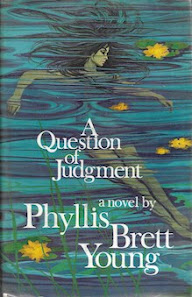This year will be forever remembered as the one in which Sexpo '69 was added to my collection. An elusive book, published in 1969 by Brandon House of North Hollywood, I spent at least two decades on its trail. My pursuit ended this past summer. The book set me back over one hundred dollars.
I'm betting it was worth every penny and that Lisa and considerate, gentle, sophisticated Bobbie will not disappoint.
"What?" I hear you say. "You mean you haven't read it!"
No, I have not. Too busy.... so busy that I didn't visit the Strand during last month's trip to New York. I did find time for Trump Tower, but only because it was so close to my hotel. I expected to be underwhelmed, and was more than underwhelmed. This was during the weekend of the New York City Marathon, and yet the place was nearly deserted.
The length of my tie is not a political statement.
Each of this year's ten best book buys was found online, which is a sad state of affairs given recent travels. These are the remaining nine
:
Behold the HourJeann Beattie
Toronto: Ryerson, 1959Jeann Beattie won the Ryerson Fiction Award for
Blaze of Noon (1950), her debut novel.
Behold the Hour, her second and last, is set in the early days of CBC television. I didn't think much of the novel, but illustrator Ken Elliott's dust jacket is a favourite.
Mrs Everard Cotes (Sara
Jeannette Duncan)
New York: Appleton, 1894
Not at all what I expected.
What did I expect? At twenty-one, I read Duncan's classic, The Imperialist, but remember nothing.
Not only a beautiful volume, but one of the year's two best reads.
One-Way Street
Dan Keller [Louis Kaufman]
London: Hale, 1960
Flee the Night in Anger, Keller's first novel, is unique as the only post-war pulp to be set in both Montreal and Toronto. There's a fair amount of travel back and forth. This second and last novel, a very attractive hardcover, begins with a man arriving in Toronto from Montreal. Will he return? The title may provide a clue.
Leonie Mason [Joan Suter]
London: C & J Temple, 1947
Following East of Temple Bar (below), Murder By Accident was the second novel by Joan Suter. Both were published the year she divorced her first husband, left England for Canada, married again, and began writing as Joan Walker. The author hid her first two novels. Why she did is a mystery. This novel is another.
Martha Ostenso
Toronto: News Stand Library, 1949
Ted Allan and Hugh Garner were published by News Stand Library under pseudonyms – not so Martha Ostenso! And the Town Talked first appeared in a 1938 edition of McCall's. Where it doesn't appear is in any Canadian reference book.
Alvin Schwartz
New York: Dial, 1948
The author's first novel. Published twenty years before he gave up the United States for Canada, it is set in Greenwich Village and concerns fallout stemming from the murder of a local pusher. Did I read somewhere that one of the characters is based on Schwartz's friend Jackson Pollack?
Joan Suter
London: C & J Temple, 1946Another favourite cover, it graces the hidden debut novel of a woman who would one day win the 1954 Stephen Leacock Medal for
Pardon My Parka and the 1957 Ryerson Fiction Award for
Repent at Leisure. I liked the novel for its depiction of a time and place in which one could make a decent living as a writer.
Frances Shelley Wees
Winnipeg: Harlequin, 1949
As Ricochet Books series editor, I've returned two Wees novels to print. Lost House, a gothic thriller involving drug runners in remote British Columbia looked to be a possible third. Sadly, it is not one of the author's best.
The second book ever published by Harlequin!
A Question of Judgement
Phyllis Brett Young London: Allen, 1970
Phyllis Brett Young published six books between 1959 and 1969 — and then nothing in the remaining twenty-seven years of her life. One wonders what happened. A Question of Judgement, her last, was first published in 1969 by Macmillan of Canada. This British edition, which appeared the following year, has the better cover.
This year the Dusty Bookcase received several gifts and review copies.
Quebec history and literature enthusiast Helen Meredith gave me this copy of Kurt W. Stock's All Quiet on the Russian Front (Richmond Hill, ON: Pocket, 1973), which she spotted at a Montreal Salvation Army Thrift Store. Another in the Simon & Schuster's short-lived "series of original Canadian books." I'd never seen a copy.
Novelist Lee Goldberg, publisher of California's Cutting Edge Books, sent three newly-reissued novels – initially published between 1948 and 1961 – with Canadian settings: Muriel Elwood's Heritage of the River, Robert McCaig's The Burntwood Men, and The Tall Captains by Bart Spicer.
Karyn Huenemann of
Canada's Early Women Writers gave me a copy of
The Ninth Vibration and Other Stories (Toronto: McClelland & Stewart, 1922) by Theosophist and mystic L. Adams Beck. Like
Sexpo '69,
The Ninth Vibration and Other Stories sits near the top of my TBR pile.
Here's looking forward to next year's book purchases.
Here's hoping some will be found in physical book stores.
Related posts:






































